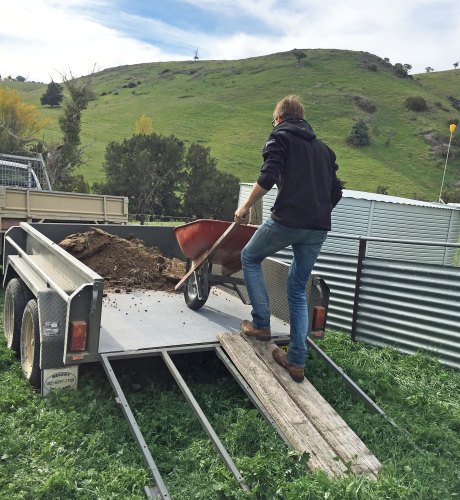I love work.
I can watch it all day.
For several days this year I’ve had an extra farm assistant in the form of backpacker Emil, who’s been doing things that I’ve managed to avoid for months, but know are necessary.

He meticulously painted the trailer, which got left in the paddock last year becoming horrendously rusty from the acid in a load of mulch, all because the paddocks were so slippery and boggy we couldn’t move it. Now it’s been rust treated and looks fabulous – as fabulous as a grey mulch trailer can look, anyway.
He also plunged into the depths of the Adnamira woolshed for the worst chore remaining on my list – digging out the years of compressed sheep poo from around the chutes and counting-out pens underneath. This has been urgent because termites managed to get in and damage some of the woodwork, including eating a whole slide (where the shearers push the shorn sheep down into the lower pens), and several joists supporting the floor. There was no way to replace those pieces, or put in “ant caps” at the top of the old foundation posts until some of the buildup was removed.
Frank Kaveney’s suggestion: “all you need to do is rake it out, put it in a wheelbarrow. If you bag it up you can sell it for five dollars a bag.” I’d tried to find someone to do that, but when they heard how low the space was, no-one was keen.
Frank wasn’t offering to do it himself, even though a proportion of the buildup was from his sheep. Unfortunately, even more of it was from previous years. “That low run, you pretty much have to push an old ewe’s head down to get them through.” he’d complained.
When I mentioned the chore to friends and neighbours, a number of them said that clearing out under a woolshed was their first paying job as a teenager. Ralph Southwell had to do it by lifting panels from the grated floor of his family’s shed, and digging it out. Sounds awful.
 When Emil and I got the now beautifully painted trailer backed up as close as possible, and started to poke rakes at the problem, it turned out that raking is only for loose, uncompressed sheep poo that rolls around in little balls. The stuff in the runs was caked into solid layers stamped down by generations of irritated, just-shorn sheep. That required levering the layers apart with the mulch fork (one of my favourite implements) and smashing them into pieces small enough to haul out to the wheelbarrow. We took turns flailing at the layers in each run, and Emil barrowed it out to the trailer.
When Emil and I got the now beautifully painted trailer backed up as close as possible, and started to poke rakes at the problem, it turned out that raking is only for loose, uncompressed sheep poo that rolls around in little balls. The stuff in the runs was caked into solid layers stamped down by generations of irritated, just-shorn sheep. That required levering the layers apart with the mulch fork (one of my favourite implements) and smashing them into pieces small enough to haul out to the wheelbarrow. We took turns flailing at the layers in each run, and Emil barrowed it out to the trailer.
I had to keep saying to myself, “We’re mining for fruit, and vegetables, and flowers”, because this well-aged manure is mostly going on my garden.
Somehow Emil kept his smile.
We left the top corner, where the grated floor was resting on the ground, for a future project, as there was no way to crawl in from underneath.
At least I was then able to get most of the termite damage repaired with treated timber joists. Maybe that will stop the hungry beasts in their tracks.  I was tempted to take up the pest contractor’s offer of spraying the ground as well as injecting the foundations, but I’ve since read an article from the University of Melbourne about the effects of bifenthrin (“The common insecticide poisoning our rivers and wetlands”) that made my hair stand on end, so I’ll keep digging instead.
I was tempted to take up the pest contractor’s offer of spraying the ground as well as injecting the foundations, but I’ve since read an article from the University of Melbourne about the effects of bifenthrin (“The common insecticide poisoning our rivers and wetlands”) that made my hair stand on end, so I’ll keep digging instead.
The person I didn’t ask before I launched into clearing out under the woolshed, was the Bobcat Master, James O’Keefe. He says he has a vacuum that can be used for loose pellets. If only I’d known.
I’m very excited to try it, next time.

What a great guy you’ve found in that Emil, good for him, and to keep on smiling…wonderful!
LikeLiked by 1 person
Definitely!
LikeLike